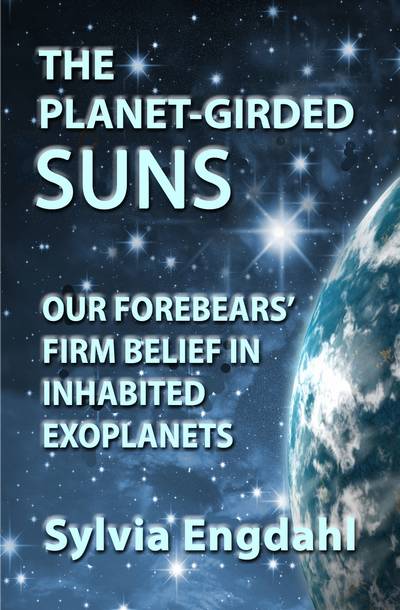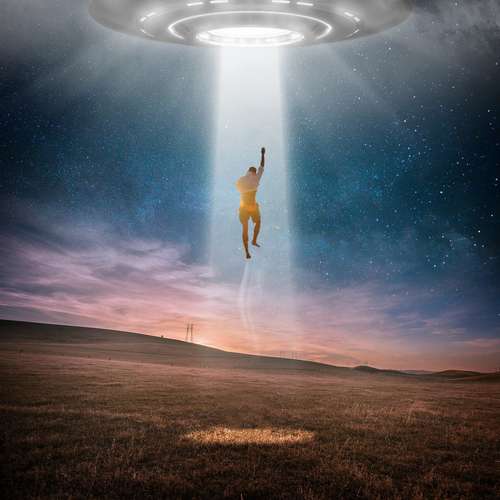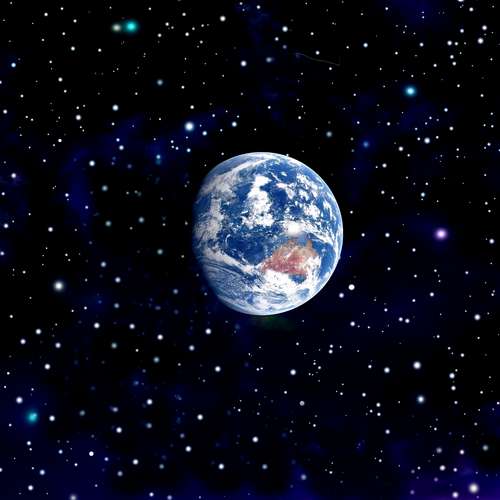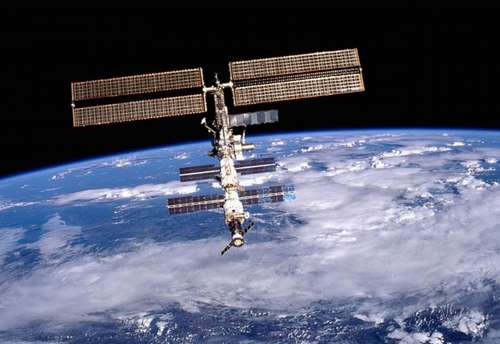
Confronting the Universe in the
Twenty-First Century
by Sylvia Engdahl
The following essay is a slightly revised version of the Afterword to the updated edition of my nonfiction book The Plenet-Girded Suns. It appeared online in The Space Review on July 23, 2012. An important update from the 2016 edition of the book is included here and in my book From This Green Earth.*
Like most space advocates, I have long been discouraged by the slowness of our progress in becoming a spacefaring civilization. I have sought desperately for a way to combat the widespread indifference to that goal.
But is it really indifference? Early in this century I came to believe that the past four decades’ waning enthusiasm for space travel on the part of the general public is due to something deeper than that. I think, as I said in a 2006 essay at my website, that it is a matter of unconscious fear. In revising my 1974 book The Planet-Girded Suns for its 2012 republication, I became more than ever convinced that this is true—and yet I now feel that our society’s current ambivalence toward space may not be the tragedy that I once thought. In historical context, it can be seen as a natural and predictable stage of human progress.
In the seventeenth century, all but an exceptional few resisted the idea of a universe full of solar systems because it shook the foundations of the safe, stable world they knew. The root of their resistance was fear. It is widely recognized that the men in high positions, both religious and secular, were afraid that upsetting the established conception of the physical world would undermine their authority; but it is not that fear to which I’m referring. More fundamental was people’s instinctive, inner suspicion that if the universe was larger and less orderly than had been supposed, there was no knowing what threats it might hold.
But this fear eventually faded. The innate human desire to know more of the stars is powerful, and by the eighteenth century the intelligentsia, having gotten used to the idea of many solar systems, were envisioning them with yearning as an embodiment of God’s glory. There was, to be sure, a countercurrent; Pascal’s admission, “The eternal silence of these infinite spaces terrifies me,” is merely the earliest expression of a human reaction that is widespread, though seldom acknowledged. But in Pascal’s time and long after, humans were insulated from the universe by a gulf assumed by most to be unbridgeable. For two and a half centuries the same picture prevailed: stars are suns; some or all of them are surrounded by planets, at least a few of which are similar to, or better than, ours; their inhabitants may be the equivalent of angels; and however much we long to see those worlds, they are—by mortals, in any case—inaccessible.

Beginning in the 1930s Buck Rogers popularized the concept of space travel, but it was vewed as pure fantasy.
And then, around the middle of the twentieth century, the foundations of humankind’s worldview were shaken again. Gradually, by a growing proportion of the population, it was recognized that extrasolar worlds may not be inaccessible after all.
In past eras the distant reaches of the sky had been associated with Heaven; even people who didn’t believe in a physical Heaven had absorbed that emotional connotation from the collective unconscious of their culture. The worlds of the stars had been idealized. There had been no reason to imagine devils there—none of the speculators who viewed them as the homes of the angels, or races as superior to humans as angels, had considered the possibility of devils. In any case, the speculation was all very abstract. It had little to do with real life.
Early in the twentieth century science fiction writers, and a few far-sighted writers of nonfiction, began to envision travel between the stars; but the public perceived that as fantasy. The vast majority, if exposed to it at all, did not incorporate it into their conception either of the real universe or of the future of their descendants. The shock of the technologies produced by World War II, however—the V2 rockets and the release of atomic energy—weakened the distinction between imagination and reality. It is not a coincidence that the first UFO sightings were reported less than two years after the war ended, or that they were followed by the alien invasion movies of the 1950s, which were not, as is commonly said, veiled expressions of Americans’ fear of attack by the Soviet Union, but rather the stirring of an unconscious recognition that the universe is very much vaster, and more scary, than most people like to think.
That recognition was effectively suppressed by Hollywood’s portrayal of evil aliens in forms that could be written off as nonsense not meant to be taken seriously. But with the launch of Sputnik in 1957, and ultimately with Apollo 8’s voyage to the moon in 1968, the public was suddenly jolted into awareness that our access to space—and correspondingly, interstellar travelers’ access to Earth—is real.
Much is said about the positive effect of the photos of Earth obtained by Apollo 8, which for the first time showed our planet as a globe, a fragile refuge amid barren surroundings, and thereby launched the environmental movement. The concomitant negative impact—the spread of gut-level knowledge that space is an actual place containing little that’s familiar to us and perhaps much that we’d rather not meet—is not spoken of. But it may be no less significant. Could this be one of the reasons why interest in space died so soon after the first moon landing, resulting in the cancellation of the last few planned Apollo missions?

Alien abduction is an unconsciously-formed metaphor for the unknown terrors that may await us in space.
It is undoubtedly the cause of the rise of belief in UFO contacts; and the experience of being abducted by aliens—which in most cases is neither faked nor a manifestation of mental illness, but a perception that emerges in a form indistinguishable from memory—is, in my opinion, an unconsciously-formed metaphor for the unknown terrors that may await us in space. In the past few decades such submerged worries have spread to a wider and more literal-minded segment of society, even to some who consider themselves space enthusiasts. The decline of positive space imagery in science fiction movies and corresponding rise of fantasy and disaster films reveals that space is less appealing to the public, and its nameless potential evils are more frightening, when the universe is open to humans than it was when it could be viewed as an unreachable realm.
This explains much that has been puzzling to space advocates, who have long sought an answer to what happened to the vision that offered such promise and evaporated so suddenly. Expansion into the new ecological niche of space is clearly a new stage of human evolution, yet after brief acknowledgement at the time of the first moon landings, our society as a whole has been blind to this . . . or perhaps not. Perhaps underneath people know it all too well. Even space supporters often feel no urgency about bringing offworld settlements into existence; many dream of them as symbols of a hopeful future, but some dreamers, like almost everyone else, may be reluctant to take the plunge. Relatively few individuals really enjoy the thought of being on the cutting edge of a major step in human evolution, for who knows where that may lead? At the time of Columbus, uneducated people thought adventurous ships would fall off the edge of the world, a prospect they viewed with great dismay; others (according to legend), knowing the world extended beyond their maps, marked the edges with the warning “Here Be Dragons.” Figuratively speaking, most people of our time may feel the same way about space exploration.
As members of the baffled minority have bitterly noted, we have spent forty years aimlessly circling Earth in low orbit, with no commitment to venture any further. The false dawn that science fiction author Robert Heinlein postulated as a mere fictional device, not intending it as prophecy, has ironically proven to be a truer portrayal of the post-Apollo era than the vision of space travel by which he and his readers were inspired. By now some people are even claiming (or perhaps hoping?) that the moon landing we once achieved was a hoax. No one who watched that landing foresaw such an outcome; of all the predictions that might have made about the near future, the cessation of exploration would have seemed the least likely. And yet, seen with hindsight, it is not strange.

Most people of our time may be unconsciously apprehensive about contact with the universe.
The assimilation of awareness that this planet is not isolated from the universe is a far more profound upheaval in human thought than the one that aroused so much opposition in the seventeenth century. People of that era were uncomfortable with the idea that the earth moves around the sun, and the sun is only one of many; but they did not suppose that this might have an impact on their personal lives or those of their grandchildren. The idea of contact with other worlds is another matter entirely. Whether we go there or their inhabitants come here, a major shakeup of Earth’s civilization is inevitable. Writers who have contemplated this issue have been warning about “culture shock” for a long time, and more recently some have begun to suggest that the notion of hostile aliens may not be as silly as was once assumed. Either way—and even, or perhaps especially, if explorers were to encounter some incomprehensible presence in space that does not fit our present conception of “aliens”—the ways of thinking based on millennia of human tradition would be shattered. Without that foundation the average person’s life would be in shambles.
These are not new ideas; they have been discussed for years, both by serious science fiction and by nonfiction, in speculation about the consequences of actual alien contact. But the average person is not a reader of either, and those who do read them—members of the minority attracted to the challenge of space—do not realize how much emotional impact such underlying implications have already had on the population in general. Most people do not want to contemplate the significance of an open universe. They do not let uneasiness about it into their minds; but underneath, as the collective unconscious of humankind absorbs the knowledge, they grasp it, and react with dismay disguised as apathy. It does not occur to them that they might be disturbed by the prospect of space exploration. Rather, they believe that although in theory they want humankind to reach new worlds, it’s of low priority compared to the problems of here and now.
Thus the excitement that prevailed at the time of the early Apollo flights was overwhelmed by the emotion aroused by the sight of Earth’s beauty and fragility as seen from space, and the focus of the majority turned inward. “Earth must be protected,” became the watchword. Protected against what? The threat of nuclear war had been seen with alarm for the past quarter of a century; the competition with the Soviet Union to reach the moon was, after all, a response to that threat. The threat to the environment, though newer, was recognized by some and would eventually have become apparent without the impetus provided by the moon flights.

The sight of Earth in space created awareness that our world in vulnerable.
So the public, without conscious recognition that anything more than economics underlies its reluctance to fund more space expeditions, has succumbed to what perplexed space advocates have interpreted as indifference. It is, I believe, the opposite—far from lacking emotion about other worlds, most people who are in no hurry to see a human presence established there are suppressing ambivalent emotions of extraordinary power. Nothing less can explain the vehemence with which some reject any suggestion that extraterrestrial resources would be of inestimable value in preventing the depletion and pollution of our home planet. Nothing less can account for the fact that Earth-worship has become a religion—sometimes even in the literal sense—to many, or the claim that it is not merely foolish, but morally wrong to advocate the spread of humankind beyond the one small world that overpopulation would otherwise eventually ruin.
What people feel most strongly about does usually find religious expression, and because contrary to a common misconception, traditional religions do not oppose belief in extrasolar worlds, the notion that Earth is the only place of value in the entire universe has given rise to a new one. To be sure, there is an alternate form of moral opposition to interest in new worlds. Ever since space travel became feasible some have opposed it on the grounds that with it, we would be bound to destroy native races elsewhere. In popular culture this, the reverse of the alien invasion idea, is reflected in the hit movie Avatar, in which humans are portrayed as evil invaders of an alien paradise. The fallacy in the film is not the theme that taking over an inhabited world would be wrong; of course it would be—no modern space advocate would countenance establishment of enclaves on inhabited planets. (Attitudes have changed radically since Heinlein’s fiction did so.) Only rationalization of the fear of unknown realms causes people to emotionally accept the premise that this would happen.
I sometimes wonder if the widespread conviction that the public no longer cares about space may also be a rationalization. After all, if the public has lost interest, then one need not question one’s own reluctance to support space programs—even if underneath one feels a conflicting impulse to rejoice in the awesome spectacle of a launch. A politician need not feel any obligation to fund them, no matter how many activists explain why they should be funded. When a candidate for the 2012 presidential nomination proposed returning to the moon, the other candidates did not argue against the idea; they simply ridiculed it. Ridicule is a convenient weapon against buried feelings that one does not dare to acknowledge.
Over and over during the past four decades, space advocacy organizations have flared up, shown promise, and then died; only a few have lasted and their membership has never approached a fraction of the people belonging to environmental organizations. Time and time again space projects have been initiated, only to be cancelled before they came to fruition; even robotic Mars exploration, about which the public did show enthusiasm, has now been cut back. Nominal space supporters may well be influenced by the same inner apprehension as the rest of the population. There are, of course, many dedicated activists who have done, and are still doing, everything in their power to get us off the ground; but support for them has been ephemeral.

Slow progress toward becoming a spacefaring species is a natural stage of human evolution.
We are driven by the urge that impelled generations of our forebears to dream of other worlds, and yet whenever we are on the verge of a step toward them, we pull back. My own expectation of seeing a human base on Mars within my lifetime has waned from certainty in the Apollo era to mere hope, to doubt, to despair, and finally to resignation. Yet as I have said above, I do not now view this as tragic. A tragedy is a turn of events that should have been avoidable, and I no longer believe that the present hiatus in space travel could have been avoided. When in updating The Planet-Girded Suns I reread it after passage of time, I was struck by the parallel between the cusp of the twenty-first century and that of the seventeenth; and I see that our slow progress toward becoming a spacefaring species is no less a stage of human evolution than any other overpowering change of perspective. Stages of evolution cannot be skipped or hurried; that, after all, is a major theme of my novels.
To be sure, the stage dealt with in one of those novels—the Critical Stage described in The Far Side of Evil—is characterized by great danger. When I conceived the story (in 1956) and wrote it (in 1970), I seriously believed its premise that the point in history at which a planetary civilization develops space travel capability coincides with the point at which it becomes capable of self-destruction, and that the two are mutually exclusive alternatives. By the time I revised it for republication in 2003, our lack of commitment to space had forced me to realize that the Critical Stage lasts longer than the few years I originally assumed, and to the danger of nuclear war I added mention of such threats as pollution, depletion of resources, and widespread terrorism. I still believe that humankind will remain in peril unless and until we make the effort to expand beyond this world. But I do not think that doing so is merely a matter of talking the public into it.
While this is a discouraging realization, in another sense it is cause for hope. It shows that nothing has yet gone wrong, that our retreat from the outward thrust begun by the first flights to the moon is not a sign of human failing, but a normal and inevitable reaction to those flights. Just as it would have been irrational to expect most contemporaries of Bruno or Galileo to embrace a new conception of humankind’s place in the universe, it is unreasonable to expect it of ours. It takes time for a culture’s fear of the unknown to fade.

People have been drawn to the stars since the dawn of history.
Yet it does fade, and the human longing to reach the stars is stronger and more lasting than the hesitancy brought on by frightening new worldviews. People were drawn to ideas about stars long before the concept of solar systems arose. We have gazed at them since the dawn of history, and nothing short of a fundamental change in human nature could make us turn away. This is not the place to discuss my conviction that the collective unconscious of humankind contains perceptions of reality not acquired through experience, and that the sky has—in all cultures—been a symbol of human aspiration precisely because our future survival depends on going there. Understanding of our present situation does not depend on belief in destiny. It is enough to compare the predominant feelings toward space of the eighteenth century with those of the early seventeenth, and those of the 1960s with those of the 1930s, to see that a sense of relationship to the stars always returns.
To some space advocates, especially those young enough to hope for personal involvement in establishment of an offworld settlement, what I’ve said here may seem unduly pessimistic. It’s natural to shrink from awareness of what one cannot have. Many who once believed in orbiting space colonies abandoned the idea from frustration when it became apparent that it wasn’t in the cards for such colonies to be built in the immediate future, just as in the late nineteenth century people stopped envisioning extrasolar worlds when they stopped believing that they would see them on the way to Heaven when they died. No doubt frustration, as well as fear, has played a part in the public’s loss of interest in space.
Possibly I see now what I did not see earlier only because I am past the age of hoping that I will live to watch humans travel beyond the moon (or even that far, unless a privately-funded expedition gets there). Yet to me it is reassuring to realize that, barring some major disaster to Earth’s civilization, the present unwillingness to accept the challenge of space will pass. That it is not a aberrant prolongation of the Critical Stage as I have long feared, but simply a pause to prepare humankind for the momentous journey ahead.
*
Update, July 2016
Reading this essay four years after its first publication, I feel more than ever that what I have said explains the reluctance of the public to support a major effect toward human expansion into space. The danger in confining our species to a single planet despite the possibility of worldwide disaster is too obvious for me to doubt that there are deep-seated psychological reasons for the public’s refusal take it seriously. Perhaps, in addition to the factors I have already mentioned, people do not want to think to think this danger is real, and are therefore unwilling to acknowledge it by accepting the need for an offworld presence. And yet a great deal is said about threats to Earth, and the majority of the people most concerned about them are the ones least apt to push for space colonization. So underneath, suppressed fear of the vast unknown universe must be stronger than worry about asteroid strikes, nuclear war, excessive climate change, or runaway biotechnology.
But now, there is greater cause for optimism about progress in space than there was four years ago. Now, privately-owned ships are delivering supplies to the space station, manned flights are soon to follow, and a privately-funded mission to Mars is in the planning stages. This is the first truly promising development since the Apollo era. I have always known that private investment alone could bring about a real breakthrough, but I feared that investors would not grasp the enormous economic potential of space activity and extraterrestrial resources until far in the future. I’m thankful that it has proved to be a mistaken fear.

If widespread enthusiasm had been needed for Columbus to sail, he would never have left Spain.
And so I feel sure that we are on track, and that the gradual extension of our species’ range will occur just as it always has, through the efforts of individuals who take risks for the sake of what they personally believe, or hope to gain, and thereby bring about gain for all humankind. That is how it has worked in the past—with the earliest tribes that ventured beyond their territory, with the explorers who sailed from Europe to the New World, and with the later pioneers who migrated to the American West. It is not necessary for society as a whole to support such efforts. Had widespread enthusiasm been needed for Columbus to sail, he would never have left Spain. It is only looking back that we see the full value of what individuals strive to do, and this will be as true of progress in space as it has been on our home world.
A colony on Mars may not be established in my lifetime, but I am confident that it will be during the lives of most people who are now living. Whether they like the idea or not does not matter, any more than public opinion mattered at the time Bruno first suggested that there are planets circling other suns. Ultimately we will reach some of those exoplanets, and long before we do, spacefaring will seem as natural and desirable as air travel does today. In the light of human history, we need not be discouraged by the fact that the time is not yet ripe for this outlook to prevail.
Copyright 2012 by Sylvia Engdahl
All rights reserved.
This essay is included in my book From This Green Earth: Essays on Looking Outward